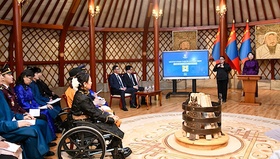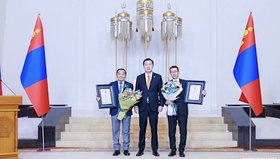At the initiative of the Chairman of the State Great Hural,Mr.G.Zandanshatar, an onlinedeliberative discussion on “Constitution Amendment Mongolia's DevelopmentModel” was held on April 14, 2021. The attendees to the discussion included Memberof Parliament, Minister of Education and Science, Mr.L.Enkh-Amgalan, Member ofParliament, Chairman of the Standing Committee on Education, Culture and ScienceMr.G.Damdinnyam, Chief Representative at the JICA Mongolia Office Mrs.Tamura Eriko, Senior Specialist of Infrastructure and Private Sector at theJICA Mongolia Office Mr. Koizumi Taiga, Leading Specialist of the Institute ofInternational Studies at the Academy of Science Dr.Prof.B.Serjav, President of the NewMongolia Academy Mr.J.Galbadrakh and Head of the OyuntulkhuurFoundation Mrs.D.Oyuntulkhuur and others.
Chairman of the State Great Hural Mr.G.Zandanshatar opened theonline discussion. The parliament isworking hard to implement the constitutional amendments. From the outset, followingthe constitutional amendments, major laws have been enacted to ensure judicialjustice, independence, and local government independence. The revolutionaryprocess of transforming Mongolian society continues successfully. TheMongolian Parliament is working on the goals of the “Three Revolutions”: Legal,Economic and Social Policy. He stressed that the social policy revolution,or reforms in the health and education sectors, is intensifying. Also, inthe context of the Economic Revolution, the reform of the Development Policyreflected in the amendments to the Constitution and the creation of theMongolian model have become very important tasks. Therefore, we areorganizing this deliberative discussion to listen to the opinions ofprofessionals, academics and researchers on this topic.
Minister of Education and Science Mr.L.Enkh-Amgalan said thereis a social need to implement education reform without delay. The draftlaw on Education Package is expected to be submitted to the Chairmansoon. The draft law then will be discussed at the spring session of theState Great Hural. He stressed that the adoption of this law will lay thefoundation for the transition to a system of sustainable implementation ofeducational programs for at least 10 years.
Participants at this discussion, organized as part of the"Develop Like Japan" initiative, shared their views on Japan's developmentmodel, experience, and opportunities for implementation in Mongolia.
The Chairman Mr.G.Zandanshatar presented a topic on “ConstitutionalAmendment and Mongolian Development Model”. During his presentation, hesaid that over the past 30 years, Mongolia's national production has collapsed,and the economy has become overly dependent on mining, copying and implementingmany inconsistent policies and models. There is noone-size-fits-all recipe for development of any country. Countries thatsucceed in implementing a unified policy and building a system shows that theyhave focused on tailored needs, resources, and circumstances of a nation. Itis clear that copying everything that is good will not be successful ifdevelopment policy is not implemented in a coherent, consistent, and plannedmanner. Disorder creates chaos. Therefore, it is necessary toimplement systematic changes. He introduced the successful developmentmodels of the countries, highlighted the good and bad experiences, highlightedthe Japanese development model, and outlined the goals to be implemented by theState Great Hural in the field of development policy and planning in the nearfuture.
The Minister of Education and Science, Mr.L.Enkh-Amgalan, presenteda topic on “Constitutional Amendments and Educational Development” and Mrs.TamuraEriko, made a series of presentations on Japan's modern reforms. Dr.Prof.B.Serjav, presented a topic on “Learning from theJapanese experience in providing ethical education to students”. She notedthat Japan's primary and secondary education policy is based on the principlethat educating children and educating them to be good person. It is importantto introduce this approach based on our culture and tradition and so that itwill help future citizens to develop the right morals. She noted thatsince the establishment of the modern educational system in Japan, the"Ethics" curriculum has been consistently followed and integratedinto the family, school and social environment. Mr.J.Galbadrakh shared hisexperience of introducing a Japanese-style school in Mongolia. Mr.Koizumi Taiga gave a presentation on Japan's NationalDevelopment Strategy and the “Comprehensive National Development Plan” projectin Mongolia. The deliberative discussion ended with a presentation on “Introductionfrom an Educational Approach” by Mrs.Oyuntulkhuur, Director of the OyuntulhuurFoundation.

 Eng
Eng  Монгол
Монгол

